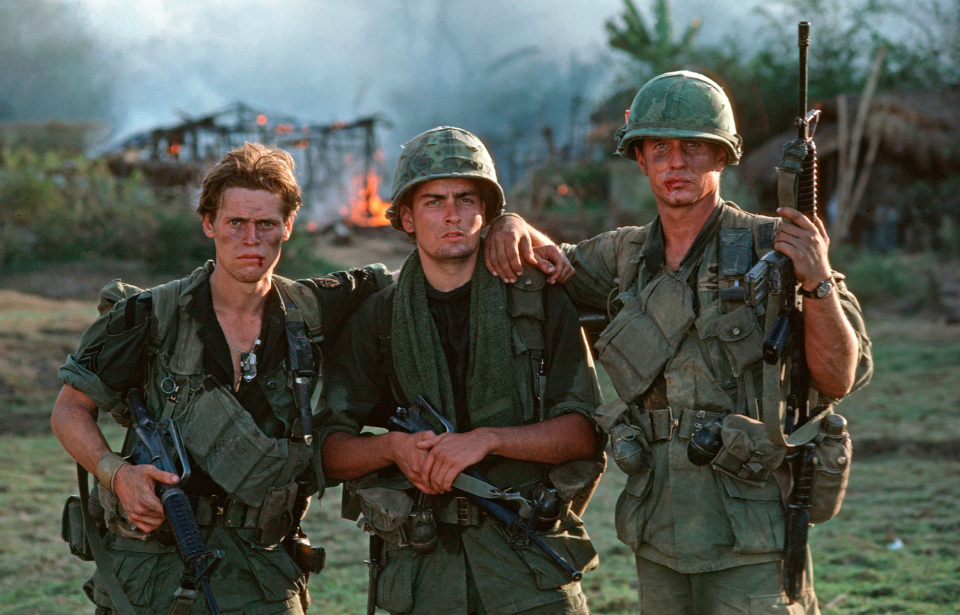Platoon (1986) is one of the greatest movies about the Vietnam War. Starring Charlie Sheen, Tom Berenger and Willem Dafoe, the film was directed by Oliver Stone, who drew upon his own experiences as a soldier during the conflict. If you liked Platoon, here are six other Vietnam-era movies you’ll enjoy.
The Deer Hunter (1978)
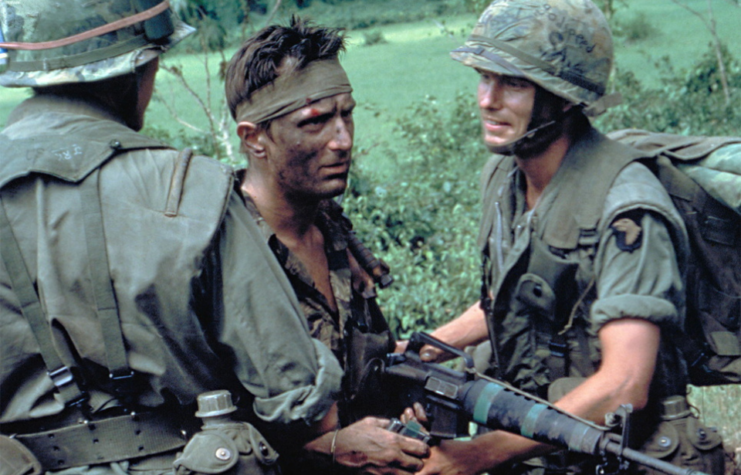
The Deer Hunter (1978) follows three working-class friends – Michael “Mike” Vronsky (Robert De Niro), Steven Pushkov (John Savage) and Nickanor Chevotarevich (Christopher Walken) – in a small Pennsylvania steel town before, during and after their harrowing experiences during the Vietnam War.
The movie is divided into three distinct acts: the characters’ daily lives and relationships in their hometown; them as prisoners of war (POWs) in Vietnam; and their time after the conflict as they attempt to cope with the physical and psychological aftermath of the fighting.
The Deer Hunter explores themes of friendship, the impact of war, the trauma of combat and the struggles veterans have with readjusting to civilian life. The iconic Russian roulette scenes in the Vietnamese prison camp are particularly intense and have become emblematic of the film’s portrayal of the psychological horrors of war.
The movie also examines the ways war shapes individuals and their perspectives. De Niro’s character, in particular, experiences a significant transformation as he grapples with survivor’s guilt and attempts to support his friends who continue to struggle in the aftermath of their shared trauma.
Apocalypse Now (1979)
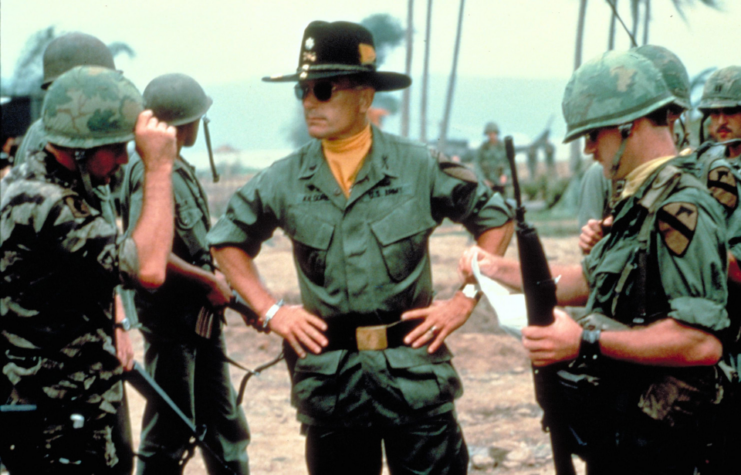
Apocalypse Now (1979) is an epic war film. Directed by Francis Ford Coppola and inspired by Joseph Conrad’s novella, Heart of Darkness, it follows the harrowing journey of Capt. Benjamin Willard (Martin Sheen), a US Army officer assigned to locate and “terminate with extreme prejudice” Col. Walter E. Kurtz (Marlon Brando), a renegade Special Forces officer who’s gone rogue in the Cambodian jungle.
The film is characterized by its dark and surreal exploration of the psychological toll of war. As Willard travels upriver on a US Navy patrol boat, he encounters a series of increasingly disturbing and surreal situations. He witnesses the chaos, brutality and moral ambiguity of war, as well as the psychological breakdown of soldiers affected by the conflict.
The journey to Kurtz’s remote compound becomes a descent into madness, with Willard confronting his own demons and questioning the nature of authority, power and the futility of war. In fact, Apocalypse Now includes themes of the inherent darkness within human nature, the blurred lines between civilization and savagery, and the moral complexities of warfare.
Full Metal Jacket (1987)
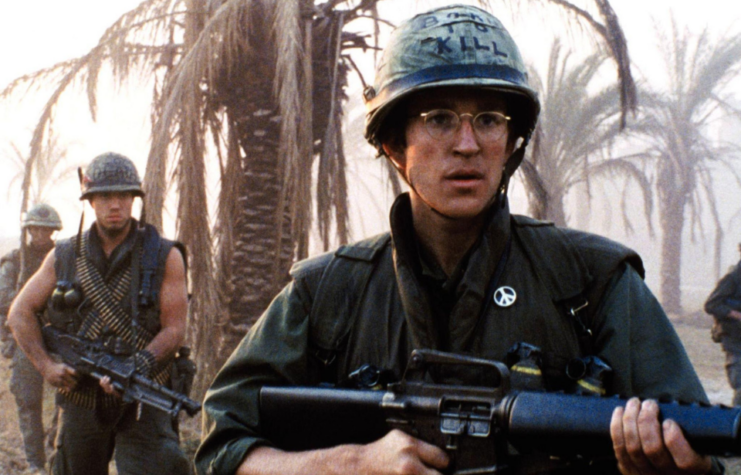
Full Metal Jacket (1987), directed by Stanley Kubrick, is a movie that’s divided into two distinct parts, each offering a unique perspective on the experiences of US Marines during the Vietnam War.
The first half follows a group of young recruits through their grueling training at the Marine Corps Recruit Depot, Parris Island, where they’re subjected to intense physical and psychological challenges under the harsh guidance of the tough-talking Gunnery Sgt. Hartman (R. Lee Ermey). This part explores the dehumanizing process of turning civilians into disciplined soldiers and delves into the psychological toll that such training takes on the recruits.
The second half shifts to the Vietnam War itself and follows Pvt. J.T. “Joker” Davis (Matthew Modine) as he becomes a combat correspondent for Stars and Stripes. The movie takes audiences into the chaotic and brutal realities of the conflict, highlighting the harsh environment, the camaraderie among soldiers and the moral dilemmas they face in the midst of violence.
Full Metal Jacket delves into themes of dehumanization, the impact of war, the duality of human nature and the psychological effects of military training. Kubrick’s distinctive directing style, attention to detail and stark visual presentation contribute to the movie’s impactful portrayal of the Vietnam War, and the film’s structure allows it to explore both the training process that molds soldiers and the consequences of said training in the context of actual combat.
Hamburger Hill (1987)
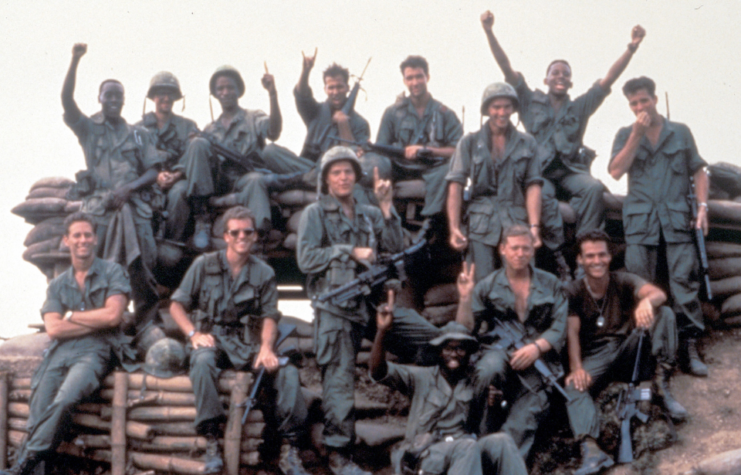
Hamburger Hill (1987) is based on the real-life Battle of Hamburger Hill during the Vietnam War. The movie provides a gritty and realistic portrayal of the intense and brutal combat during the 10-day engagement to capture Hill 937 – “Hamburger Hill” – during the middle part of May 1969.
The film follows a platoon of young and diverse soldiers as they struggle to advance against a well-fortified enemy position. The battle is depicted in visceral detail, showcasing the challenges, sacrifices and horrors the soldiers face navigating the treacherous terrain and engaging in relentless combat.
Hamburger Hill examines the futility of some military operations during the Vietnam War, as the soldiers question the purpose and strategic value of the hill they’re fighting to capture. The movie also touches upon the controversies and debate surrounding the war effort back home and the disconnect between soldiers on the ground and the decisions made by high-ranking officers.
Through its realistic portrayal of warfare, Hamburger Hill conveys the physical and emotional toll combat can have on soldiers, and it emphasizes the complexities and moral dilemmas inherent in war. The film serves as a tribute to those who fought in the battle and offers a sobering look at the human cost of armed conflict.
Casualties of War (1987)
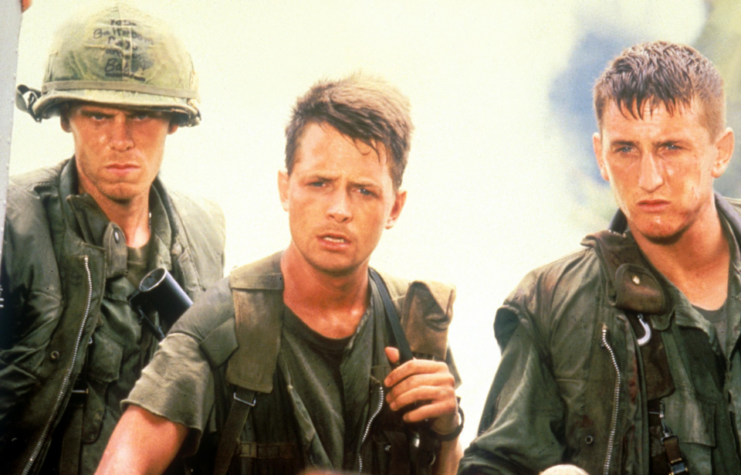
Casualties of War (1987) is based on the true story of a group of American soldiers during the Vietnam War who commit a horrific crime against a young Vietnamese woman.
The movie follows Pvt. Max Eriksson (Michael J. Fox), a morally conscious soldier who becomes a witness and an unwilling participant in the abduction, assault and murder of a Vietnamese girl by his comrades. As events progress, Eriksson struggles with his sense of duty, morality and loyalty as he tries to prevent and, then, expose the crime.
The movie offers a sobering and disturbing look at the brutal realities of war and the potential for cruelty that can emerge in the midst of conflict. Its portrayal of the internal conflict faced by Eriksson and the ethical dilemmas he confronts add depth to the narrative and highlight the complexities of human behavior in extreme circumstances. The film serves as a powerful exploration of the dark side of war and the capacity for cruelty and compassion that can coexist within individuals.
Born on the Fourth of July (1989)
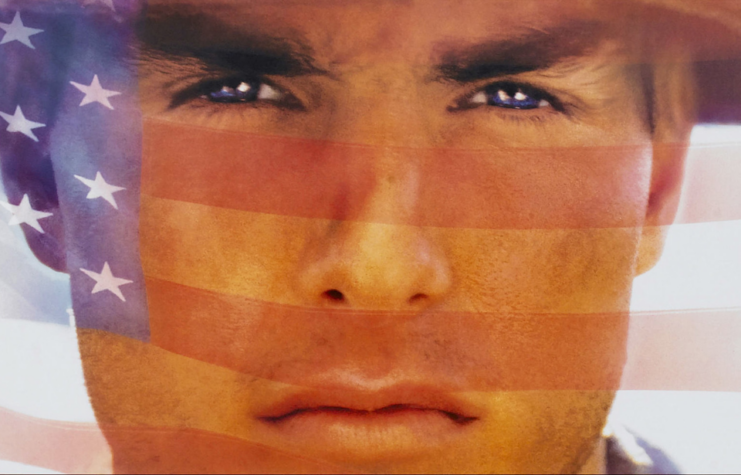
Born on the Fourth of July (1989) is a biographical war drama directed by Oliver Stone. Based on the real-life experiences of Ron Kovic, it follows the Vietnam War veteran’s journey from an eager and patriotic young man to a disillusioned and outspoken anti-war activist in the aftermath of the conflict.
The movie stars Tom Cruise as Kovic and portrays his transformation from a starry-eyed teenager who enlists in the US Marine Corps with patriotic fervor to a paralyzed veteran who becomes a vocal critic of the Vietnam War and a passionate advocate for veterans’ rights.
More from us: Dale Dye Ensured These Military Movies Were As Authentic As Possible
Born on the Fourth of July examines themes of patriotism, disillusionment, the impact of war on individuals and society, and the challenges faced by veterans as they return home. It portrays Kovic’s physical and emotional struggles following his paralysis in combat, including the difficulties he encounters while adjusting to his new reality.
